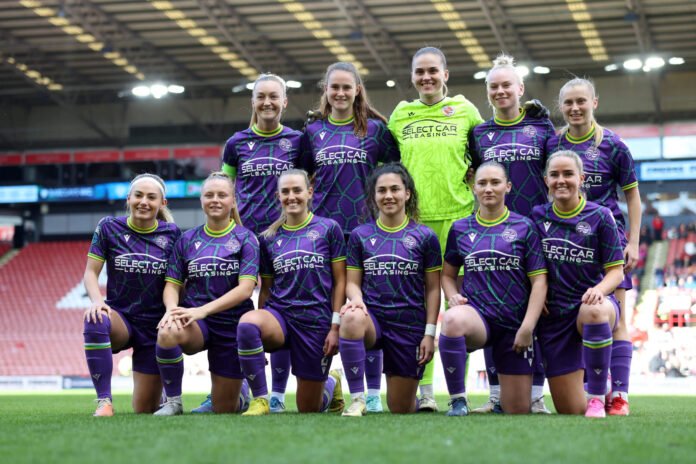The future of Reading’s women’s and girls’ teams is up in the air, with uncertainty over whether the senior side will play in the Championship next season.
Academy staff, players and parents have been warned there is no guarantee age-group teams will operate in 2024-25, the mother of one of the club’s under-21 players told the BBC.
The Guardian reported that only two senior players are contracted to the club, meaning there will need to be significant developments if they are to compete in the forthcoming season, which begins on September 7. It is a considerable fall for a team who were only relegated from the Women’s Super League at the end of the 2022-23 season.
It always looked likely they would struggle in the second-tier Championship, having immediately moved to a part-time model despite most teams in the division being full-time. There was a further blow as long-term manager and director of football Kelly Cousins (nee Chambers) announced she was joining Utah Royals as their inaugural sporting director.
Behind all this is owner Dai Yongge and his chaotic management of Reading as a whole. Currently attempting to sell the club, Reading’s men’s team have had deductions worth 16 points over the past three seasons. They are now in League One, the third tier of English men’s football. Under Yongge, who took control of the club in 2017, wages and tax bills have gone unpaid, staff have been made redundant and Reading have been placed under a transfer embargo.
Reading fans protest against owner Dai Yongge at a men’s team match in January (Marc Atkins/Getty Images)
Fans have repeatedly protested against his ownership, with anger crystallising around the proposed sale of Bearwood Park, Reading’s training ground that was built five years ago, to Wycombe. Yongge has been attempting to sell the club for months, with Reading Supporters’ Trust recently releasing a statement saying: “Mr Dai remains determined to sell and we can confirm multiple parties remain interested in the club — talks are progressing, although it has been a slower process than originally hoped.”
Such ownership issues are a depressingly common feature of English football. Rich owners are regularly allowed to mismanage clubs, with little concern for their status as valuable community institutions. Women’s teams are often the first pillars to fall when it comes to cost-cutting. Players earn far less than their male counterparts, which can make the uncertainty more damaging, and there tend to be fewer options at senior and academy levels.
Today, we launch a billboard campaign in the town to highlight the plight of @ReadingFCWomen .
It goes live at 5pm – if you get some good pictures, please tag us.
Please find below our imagery and a supporting statement 👇#ReadingFC#SellBeforeWeDai pic.twitter.com/CCo3nXBudb
— Sell Before We Dai (@SellBeforeWeDai) June 26, 2024
The willingness of clubs to drop their women’s teams on a whim has long been a feature of the game. Manchester United did it in 2005 when the Glazers completed their takeover, then Charlton Athletic did the same two years later when their men’s team were relegated from the Premier League. London City Lionesses declared independence from Millwall in 2019 after they felt they were being held back by the men’s club and in 2021, Leyton Orient withdrew permission for their women’s team to use their name so they could start their own side. They now play in the seventh tier, when previously they were in the fourth.
Women’s football teams are repeatedly reminded that from the professional game to grassroots, their ability to play is a favour rather than a right. Only last week, Thornaby FC were forced to reinstate their girls’ teams following public outcry at their decision to cut them. The same implication was echoed in Manchester United owner Sir Jim Ratcliffe’s comment that they “(hadn’t) got into that level of detail with the women’s team yet” because they had “been pretty much focused on how we resolve the (men’s) first-team issues”.
This attitude is not going to change any time soon, despite the increased popularity of women’s football. The same scenarios are being played out at clubs of many levels across the country, as men’s teams are prioritised. Given the smaller fanbases of women’s teams down the pyramid, the attention given to them can often be limited. It is crucial women’s football fans speak out for these clubs.
It is also necessary for men’s football supporters to pay attention to what is going on with their club’s women’s team. Too often the attitude is that until it affects the men’s team, it does not matter — but cuts to women’s teams can be the canary in the coal mine. Slashing entire budgets for a women’s team will rarely save large sums of money but it can demonstrate owners are more interested in penny-pinching than they are in building football teams reflective of the whole community. That involves men’s and women’s football, at whatever level.
It remains accepted within the game that the natural order is for men’s football to be prioritised, but dig deeper and you will find that hierarchy takes away more from what it means for a club to be than what it adds. The experiences at Reading make that loud and clear.
(Top photo: George Wood — The FA via Getty Images)
Read the full article here


